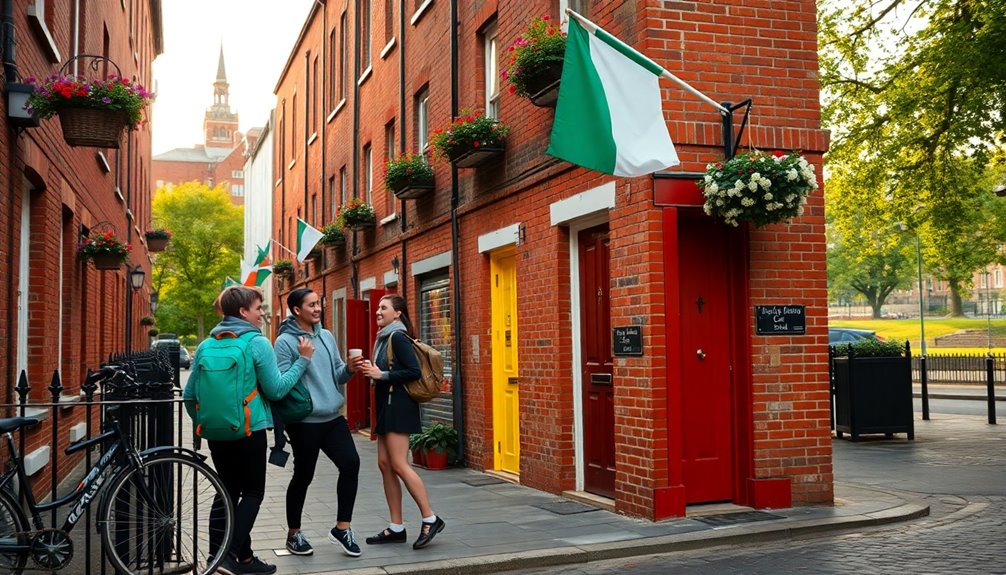
If you’re learning English in Ireland, pick a safe, student-friendly neighbourhood near your school to cut commute time and stress. Expect higher rents in Dublin, mid-range in Cork and Galway, cheaper options in smaller towns; shared housing saves money and builds social life, while private lets offer more privacy. Learn lease basics, get receipts for deposits, and inspect the place. Want tips on transport, groceries, and choosing the right flat for your budget and lifestyle?
Highlights
- Choose neighbourhoods near your school with safe streets, good transport links, and affordable shops to save time and money.
- Decide between shared housing for lower costs and social life or private rentals for independence and higher rent.
- Budget for higher rent in Dublin, mid-range in Cork/Galway, and lower prices in Limerick or smaller towns.
- Read leases carefully, get a deposit receipt, and document the property condition to protect your rights.
- Visit accommodations at different times, talk to current students, and trust your instincts about safety and vibe.
Choosing the Best Irish Neighbourhoods for Students
When you’re choosing a neighbourhood in Ireland as a student, think about more than just rent — you’ll want safe streets, easy transport links, affordable groceries, and places to study or unwind. You’ll want to scout student hangouts for low-cost social life and inspiring study spots that feel yours. Check local markets for fresh food and budget finds, letting you eat well without feeling tied down. Talk to current students, visit at different times, and trust your gut about safety and vibe. Pick a place that supports both your independence and daily routine, so you can focus on learning.
How Close Is Your School: Commuting and Travel Times
Think about how long you’ll spend getting to class each day — a short commute can give you more study and sightseeing time. Check typical travel times from different neighborhoods and the commuting options nearby, like buses, trams, trains, and bike routes. If you’re weighing housing choices, consider both the daily travel time and the reliability of those transport links.
Travel Times Overview
Because your daily routine depends on it, knowing typical commute times to your school helps you plan classes, work, and free time without surprises. You’ll find that actual travel depends on where you choose to stay and which public transport or walking routes suit your pace. Estimate peak and off-peak durations, check timetables, and allow extra time for weather or events. If you prefer spontaneity, pick accommodation within flexible travel routes so you’re not locked into long trips. With realistic commute expectations, you’ll keep control of your day, protect study time, and still enjoy exploring Ireland.
Commuting Options Nearby
If you’re choosing a school, knowing the commuting options nearby will save you time and stress—walking, cycling, buses, trams, trains, and rideshare all shape how easily you’ll get to class. Think about your daily rhythm: do you want quick walks, reliable public transport, or freedom to bike? Check schedules, peak travel times, and how long door-to-door trips take. Look for safe cycling options, secure bike parking, and nearby cycle lanes. If you value flexibility, rideshare or regional trains can extend your reach. Choose a school that matches how you like to move — simple, independent, and efficient.
Budgeting for Rent: Typical Prices by City

When you’re planning your move to Ireland, rent is one of the biggest monthly costs to get right, so it’s useful to know typical prices across cities and what they include. Dublin’s higher rents mean budgeting carefully; expect utilities sometimes extra. Cork and Galway are mid-range, with more flexible options and occasional bills included. Limerick and smaller towns offer lower rents and more breathing room for travel or classes. Use rent negotiation and smart budget tips—like tracking utilities and lease terms—to keep freedom in your lifestyle. You’ll feel steadier choosing a city that matches your financial pace and goals.
Shared Housing vs. Private Rentals: Pros and Cons
Now that you’ve got a handle on typical rents by city, the next big choice is whether to look for shared housing or go for a private rental—each affects your budget, privacy, and social life in different ways. If you crave connection and lower costs, shared housing benefits include split bills, built‑in friends, and flexibility when you want freedom without big commitments. If you value solitude and control, private rentals offer independence but remember private rentals drawbacks: higher rent, sole responsibility for utilities and maintenance, and longer leases. Consider how much social life, cost savings, and autonomy you really want before deciding.
Finding Safe, Student-Friendly Areas and Amenities
Because where you live shapes your day-to-day experience more than almost anything else, it’s worth taking time to find neighbourhoods that are both safe and student-friendly. You’ll want easy access to local amenities—groceries, transport, cafés, parks—so you can study, socialise, and explore freely. Check crime stats, lighting, and student reviews as core safety considerations, and visit at different times to feel the vibe. Aim for areas near campus or language schools to cut commute time. Trust your instincts: if a place feels welcoming and practical, it’ll support both learning and the independent life you’re after.
Lease Basics, Deposits, and Rights for International Students
Choosing the right neighbourhood is only part of settling in—understanding leases, deposits and your rights will make living there worry-free. When you sign lease agreements, read every clause: rent, length, notice periods, and who’s responsible for repairs. Deposits are usually one month’s rent; get a receipt and know conditions for return. Familiarise yourself with tenant rights in Ireland—privacy, safety, and fair notice for inspections. If something’s unclear, ask the landlord or your school for help before signing. Keep copies of everything and document the property’s condition to protect your freedom and avoid disputes.
Some Questions Answered
Can I Bring a Pet While Staying in Student Accommodation?
Generally no — most student accommodation has strict pet policies, so you won’t be allowed to keep animals on site. You should check individual accommodation options before booking; some private homestays or approved private rentals might accept pets with conditions. If bringing a pet’s essential to your freedom, contact providers early, provide documentation, and be ready to pay extra fees or meet specific care rules so everyone’s comfortable and rules are respected.
Are Utilities (Electricity, Heating) Included in Rent Prices?
Sometimes yes, sometimes no — it depends on your rental agreements and the place you pick. Think of utility costs as a tune that might be included or played by you; read contracts so you’re not surprised. Many student digs include heating and electricity, but others bill you separately. You’ll want to ask upfront, compare options, and choose the setup that gives you freedom and peace of mind without hidden charges.
Can I Get a Short-Term Lease for Only a Few Weeks?
Yes — you can often get short-term rentals for just a few weeks. You’ll find flexible lease options through language schools, hostels, private hosts, and serviced apartments that cater to students and travelers. Be sure to check cancellation policies, included utilities, and deposit requirements. You’ll want to compare prices and read reviews so you’re free to move quickly and confidently, choosing the short-term rental that fits your schedule and sense of adventure.
Is Internet Speed and Reliability Guaranteed in Housing?
No, internet speed and reliability aren’t guaranteed in housing; providers can vary. You’ll want to check internet access details in housing policies before you book — ask about average speeds, peak-time performance, and whether there’s a backup connection. If freedom’s important, pick places advertising high-speed or dedicated lines, or confirm refunds/alternatives in the policy. Bring a portable hotspot as a backup so you’re not tied down by unreliable Wi‑Fi.
What Support Exists for Students With Disabilities?
You’ll get tailored support: schools offer accessibility services and disability resources, like classroom accommodations, exam adjustments, note-taking, and assisted tech. Staff will meet you to plan needs, connect you with local health or counseling, and arrange accessible housing or transport as possible. You’ll have a point of contact for ongoing issues, and they’ll work with you to protect your independence while ensuring learning access and safety.
Summing Everything Up
Choosing where you’ll live in Ireland isn’t just logistics — it’s where your new life will unfold. You’ll want a place that’s safe, affordable, and close enough to school to keep mornings easy. Think of your flat as a harbor: shelter after busy days, a place to grow. Trust your budget, know your rights, and pick a neighborhood that feels like it could become home — comforting, lively, and truly yours.
